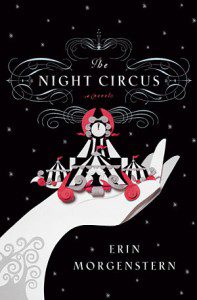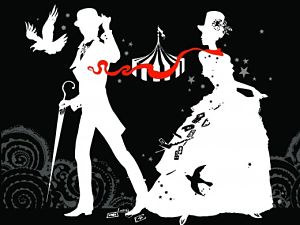Publisher: Doubleday
Release Date of Hardcover: September 13, 2011
Release Date of Paperback: July 3, 2012
Page Count: 387
ISBN-10: 0385534639
ISBN-13: 978-0385534635
“The circus arrives without warning. No announcements precede it, no paper notices on downtown posts and billboards, no mentions or advertisements in local newspapers. It is simply there, when yesterday it was not. The towering tens are striped in white and black, no golds or crimsons to be seen. … Within hours everyone in town has heard about it. … It is impressive and unusual news, the sudden appearance of a mysterious circus. People marvel at the staggering height of the tallest tents. They stare at the clock that sits just inside the gates that no one can properly describe.
Stretched across the top of the gates, hidden in curls of iron, firefly-like lights flicker to life. They pop as they brighten, some accompanied by a shower of glowing white sparks and a bit of smoke. …When the final bulb pops alight, and the smoke sparks dissipate, it is finally legible, this elaborate incandescent sign. … It reads: Le Cirque des Reves.”
Le Cirque des Reves is translated as “The Circus of Dreams,” which is an astounding feat of mechanical engineering for the Victorian era propelled and maintained by awe-inspiring magic. The illusionists who bring the fantastical to life are Celia and Marco, two souls who were bound since childhood to battle in a competition designed by their fathers with dangerously high stakes. Predetermined destinies are questioned and defied through acts of free will, and of course, with magic.
One is tempted to categorize The Night Circus as faux Victorian literature (similar to Sarah Water’s novels, Fingersmith and Tipping the Velvet, which are set in the same era), yet it is in actuality a masterful work of magic realism, in which magical elements seamlessly blend with the real world and the “real” and the “phantasmagorical” are in the same stream of thought.
Richly described characters, compelling dialogue, decadent details, and poetic prose bring to life a compelling plot line making this novel one of the most remarkable and outstanding fictional debuts of the past year.
The novel’s self-fulfilled prophecy of “bestsellerdom” began with a seven-figure advance and rights sold to more than 25 countries, grew louder with a film deal to the studio that brought us Twilight, and continued in mid-summer with lengthy pieces in The Wall Street Journal and USA Today on the debut novel’s advance hype. Booksellers – both of the independent and mainstream – have also rhapsodized over Morgenstern’s debut with seemingly unending praise.

Set in the late 19th and early 20th century, in and around major cities across the world, including New York, London, Paris, and Boston, Le Cirque des Reves appears (and disappears) suddenly much to the entire city’s excitement, amazing audiences with acrobats, contortionists, psychics, and elaborate tents (such as an intricate Ice Garden), a labyrinth made of clouds (“an excursion in dimension, a climb through the firmaments, there is no beginning, there is no end, enter where you please, leave when you wish, have no fear of falling”), a Stargazer ride which catapults you to the heavens where your fortune can be revealed by an intrepid character named Poppet, all revolving around a cauldron of fire and a surreal clock made of dreams that “expands and contracts, like pieces of a puzzle.”
“The face of the clock becomes a darker grey, and then black, with twinkling stars where the numbers had been previously. The body of the clock, which has been methodically turning itself inside out and expanding, it is now entirely subtle shades of white and grey And it is not just pieces, it is figures and objects, perfectly carved flowers and planets and tiny books with actual paper pages that turn. There is a silver dragon that curls around the clockwork, a tiny princess in a carved tower who paces in distress…. Teapots that pour into teacups and minuscule curls of tea that rise from them as the seconds tick. Wrapped presents open. …An entire game of chess is played.”
Celia steals the show again and again with her gifts of illusion which rival her world-renowned father, Prospero the Enchanter. She stuns her audiences with telekinetic, psychic, transmogrifying, incredible feats that defy gravity and astonish even the most cynical and pragmatic as she transmutes objects into birds, metamorphoses her appearance in seconds, heals wounds instantaneously, and literally levitates her audience members several inches off the ground during her performances. Thus, although she deems the title of an “illusionist” her illusions are actually real transmutations that astound both her audience and the readers of The Night Circus who have been captured and seduced by Morgenstern’s breathtaking prose.
Her competitor, Marco Alisdair, a former guttersnipe who was adopted and rigorously trained by A.H. (the mysterious character repetitively referred to as “the man in the grey suit”). Marco performs his illusions for the circus clandestinely while simultaneously serving as the assistant of the cirus’s cantankerous proprietor, Chandresh Christopher Lefevbre. We discover that Marco’s magic is vastly different from Celia’s (yet equally powerful), as he can manifest entire worlds at will, inventing environments of impressive beauty simply by passing his hands over one’s eyes.
Underneath the glamour and glittering world of the performers and tent after tent of wonders, we discover that the circus is itself the chess board for the two illusionists, Marco and Celia, and the competition between them established by their avaricious fathers who have proclaimed that the loser of this game shall die. According to Prospero the Enchanter, the circus, as miraculous as it is, is only a venue and/or an exhibition. He says to Celia, “You push the bounds of what your skills can do using this circus as a showplace. You prove yourself better and strong. You do everything you can to outshine your opponent.”
Little does Prospero realize that the two opponents would fall madly and irrevocably in love. Not bearing to see one another die, they concoct a plan – rather spontaneously – to both save each other and the circus from being destroyed by the dangers of the competition. We discover the most unexpected hero possible to salvage the circus as Celia and Marco strive to alter their previously determined fate.
Underneath the lush and beautiful world of her prose, Morgenstern well understands what makes The Night Circus tick: that Marco and Celia, whether in competition or in love, are part of a wider world they must engage with but also transcend. It’s a world whose mystique and enigma is intoxicating and shall inevitably catalyze an eclectic array of long-term fans.




